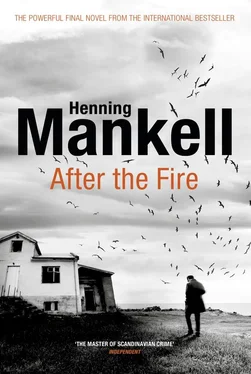I stayed on the mattress and listened to her breathing gradually grow heavier until she was asleep.
In my dream the searing light was there once more. I tried to get out of the burning house, but to no avail. The staircase was missing. There was no way down from the first floor. When I turned around, my grandmother was standing there. She shouted to my grandfather to tell him that dinner was ready; they were having boiled pike.
At that point the dream ended abruptly, with no conclusion.
I was woken by the sound of an engine. I sat up and discovered that the bed was empty, and Lisa’s clothes and handbag were gone. I ran outside; her boat was just pulling away. When she saw me she waved and pointed to the jetty. I walked across the damp grass; she had left a folded piece of paper under a stone on the bench. The name of her newspaper was at the top.
You were sleeping so deeply that I didn’t want to wake you. But at least you know a little bit more about who I am now.
I climbed down into the water. The cold sliced through my body. I counted to ten out loud before heaving myself onto the jetty, then I ran back to the caravan and got into bed.
I woke several hours later, finally feeling rested. I decided I needed to work out how I was going to deal with the risk of being arrested. As I yanked back the curtain the fitting came away from the plastic wall; I threw the curtain out of the door. If it didn’t want to be there, I wasn’t going to waste time trying to fix it.
I went outside. If I was going to be able to think clearly, I needed to move. I put my binoculars around my neck and made my way down to the skiff. It was half full of water, and I had to bail it out before I set off for the skerry where my tent was.
The wind was a north-easterly. Far away on the horizon I could see a dark bank of cloud. I rowed to the skerry as fast as I could in order to warm myself up and get my circulation going.
The tent was empty, but I could see straight away that someone had made a fire among the stones. Next to a juniper bush lay empty tins that had contained American corned beef. There were no other traces of the person who had been using my campsite. I walked around the skerry to see if I could find anything; an empty milk carton was jammed between some smaller rocks, but it could simply have drifted ashore.
I wondered whether to leave a message for the mysterious visitor. I crawled into the tent and stretched out on my sleeping bag.
As I lay there with the grey light seeping in through the porous fabric, I thought that Lisa Modin was closer to me than I had dared to believe possible. The age difference between us was considerable, but I was starting to believe that she needed me in some way, just as I needed her.
It was an exciting prospect. I headed home without leaving a message on the skerry. To give myself more exercise, I rowed around my island before mooring at the jetty.
I would make a plan. Not just for the next few days, but for the future. I would suggest to Lisa that we took a trip together. If there was a place she dreamed of visiting, I would pay for us to go there. If she didn’t have anywhere specific in mind, I would make suggestions. Somewhere hot. The Caribbean perhaps, or even further afield — a Pacific island.
For the first time since the fire I was in a good mood. I hurried up to the caravan, eager to start formulating my thoughts. As I stepped inside, my phone rang. I recognised the number.
It was Louise. She was talking fast, and her tone was forced. The line was bad too; I asked her to slow down. She said she didn’t have much time. I could tell that she was frightened and on the verge of tears. Stammering, almost shouting when I interrupted her to say that I could hardly hear her, she told me that she had been arrested. She was being held by the police in Paris and needed my help. I tried to ask her what had happened, but she wasn’t listening; she just kept repeating that she needed help.
The connection was broken. Her voice echoed inside my head. I tried her number but couldn’t get through.
I had never heard her sound so scared. I went outside, taking the phone with me in case she called again. I sat on my grandfather’s bench even though the wind had increased, and I immediately started to shiver.
My passport had been lost in the fire, but I knew that it was possible to obtain a provisional passport at the larger Swedish airports. I called the bank and managed to speak to the clerk who had helped me before. My new card had arrived.
I didn’t need to give the matter any more thought. I called Jansson and asked him to pick me up in an hour. Naturally he wondered if the engine was giving me trouble again.
‘No. I just need transport, nothing else.’
I dug out an old bag left over from Harriet’s time and packed my Chinese shirts, my underwear and my phone charger. I gathered up the cash I had, then wrote a note to Alexandersson. I didn’t want anyone to think I’d done a runner. I told him that my daughter was in trouble and needed my help, and I hoped to be back in a few days.
I was waiting on the jetty when Jansson arrived, punctual as usual. We shook hands; he was always very particular on that point.
‘I expect you’re going to the harbour,’ Jansson said. ‘When do you want to come back?’
‘I don’t know.’
The sea spray was fresh and cold as we sped across the water. Jansson dropped me off by the petrol pumps, and I gave him a hundred kronor as usual. By the time he left the harbour I was already on my way to the coastguards’ office. I had folded the piece of paper and written Alexandersson’s name on one side.
As I was passing the chandlery I couldn’t resist popping in to ask Margareta if my wellington boots had arrived. They hadn’t.
‘I’m going away for a few days,’ I said. ‘Perhaps the boots will be here when I get back.’
‘You can never tell when orders will arrive,’ Margareta said. ‘You can’t rely on anyone these days.’
Oslovski wasn’t at home, but when I looked in the garage, all the tools were in their proper places.
The curtains were closed.
I got in the car and drove off.
I hoped to find a flight leaving for Paris that evening. I would leave my country with a slight bow.
Part Three
The Bedouin in the Bottle
During the drive to Arlanda many thoughts about Louise passed through my mind, along with memories from my younger days: hitchhiking by the roadside, travelling from town to town, sometimes even crossing the border into a new country. I remembered drivers who had stopped, but turned out to be drunk. On one occasion I was picked up by a young woman. She was driving an expensive sports car, and there was barely room for my rucksack between my legs. In broken English she informed me that she had just murdered her husband. I recalled with particular clarity that she said she had stabbed him in the back. She tried to excuse her actions by saying that he hadn’t had time to realise what was happening; I don’t know what I said in response. She suddenly slammed on the brakes and told me to get out of the car in the middle of nowhere in the dark. I don’t remember how I continued my journey.
Just as my hitchhiking to Paris always led me to Belgium, especially the city of Ghent, if I travelled by train I always ended up in the central station in Hamburg at three o’clock in the morning. I used to change trains there for Paris, where I would either stay or go on to Spain or Portugal, perhaps even across to North Africa. Homeless beggars used to wander around the deserted station in Hamburg; this was only about fifteen years after the end of the Second World War, so I always imagined that these elderly men in their long, dirty overcoats were soldiers who had survived the Western or Eastern Front. There was a dark imprint of horror in their eyes. However, I don’t recall ever giving any of them money, either because I had no German currency or because I felt too poor. The pale light transformed the enormous space into a theatre set, where the actors had left long ago but the lighting technician had forgotten to switch everything off before he went home. The few nocturnal wanderers, the passengers and the cleaners were acting out a drama that had no beginning and no end.
Читать дальше












